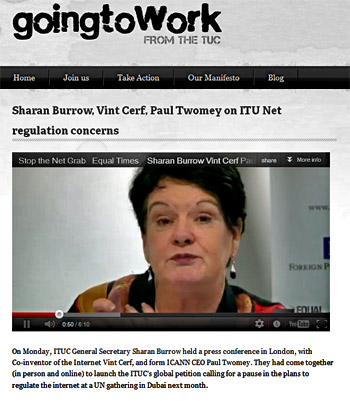ITU Treaty To Control Internet In Disarray As USA Refuses To Sign
As previously reported by this website, a proposal to hand over control of the internet to a body of the United Nations, thereby handing control over to governments and big business; is currently being discussed in Dubai.
International Telecommunications Regulations (ITR) is a treaty signed in 1988 setting out rules for how traffic should flow between different telecom networks, and how to calculate charges for traffic exchanged between carriers in different countries.
The World Conference on International Telecommunications (WCIT-12), completes its business on 14th December (today).
 The United States ambassador to the conference Terry Kramer, yesterday (13th December) announced that, "U.S. cannot sign revised telecommunications regulations in their current form." Further, Kramer stated, "ITR should be a high-level document, and the scope of treaty does not extend to the Internet."
The United States ambassador to the conference Terry Kramer, yesterday (13th December) announced that, "U.S. cannot sign revised telecommunications regulations in their current form." Further, Kramer stated, "ITR should be a high-level document, and the scope of treaty does not extend to the Internet."
The ITR ( International Telecommunications Regulations) has been subjected to a world-wide campaign of opposition, with the UK’s TUC leading a campaign along with other organisations in this country opposed to governmental and multi-national business control of the Internet.
Terry Kramer is quoted in the on-line computer news website Zdnet as saying: "world community is at a crossroads of its collective view of the Internet." He also said, the "U.S. will continue to uphold and advance the multi-stakeholder model of internet governance."
Zdnet’s coverage continues:
From an "agency" point of view, Kramer stated, "We don't want lack of clarity of the agencies subject to this. A lot of players could be subject to these regulations." The idea here is that if the definitions in the treaty are too open-ended, many ISPs, and even Web site operators could be subject to formalized regulations that the U.S. doesn't want to encourage.
The key, even though these treaties are non-binding, is that we in the U.S. don't want to set up a situation where various agencies are subject to influence because of the existence of a treaty and America's implied support. By removing America's support from the ITR, it's clear that the U.S. doesn't intend for its players to be subject to the model put forth by more oppressive nations.
 He also stated that: "On a second Internet, anything is possible," but "It's not going to be an easy task to set up a different standard, very difficult to pull off," and "We need to continue to do this outreach so we don't inadvertently allow a balkanization of the Internet."
He also stated that: "On a second Internet, anything is possible," but "It's not going to be an easy task to set up a different standard, very difficult to pull off," and "We need to continue to do this outreach so we don't inadvertently allow a balkanization of the Internet."
The bottom line, according to Kramer and U.S. policy is that, "Multi-stakeholder model is much more practical in advancing the Internet," even if the "divergence of views is significant."
Kramer believes this isn't over. He stated, "At the end of the day, these ITRs are not legally binding. What is fundamental about this is [there will need to be a] very explicit discussion about views on the Internet and how it should be managed." - ends
There is a lot of secrecy over the ITU, which does not publish proposals received from different countries, but leaves it to those countries to publish their proposals themselves.
On this point, the BBC News website’s coverage of the issue reported last week that:
‘The ITU does not publish submissions by each country - leaving it up to the individual states to decide which material to release. But a site called Wcitleaks.org has posted proposals leaked to it.
They include a submission from Russia suggesting the ITU could become responsible for allocating at least some of the internet's addresses as well as the "determination of the necessary requirements".
At present US-based Icann (Internet Corporation for Assigned Names and Numbers) co-ordinates the codes and numbering systems, deciding which new internet address endings should be allowed as an alternative to .com. It then leaves it to ISPs (internet service providers) to assign individual addresses.
President Vladimir Putin has signalled Russia's final submission could go further. In 2011 he said he was keen to discuss "establishing international control over the internet using the monitoring and supervisory capabilities of the International Telecommunication Union".
The Russia Today news service has since reported that China and India had backed this stance.’
In the UK, the campaign run by the TUC’s ‘Going To Work’ website successfully lobbied the UK government which it turns out had the same concerns as the USA.
We await the closure of the conference later today, and the final terms of any new treaty.
Source: David Gewitz / ZDNet / TUC / BBC News
See also: Internet Freedom Of Use Under Major Threat From Governmental And Business Control



